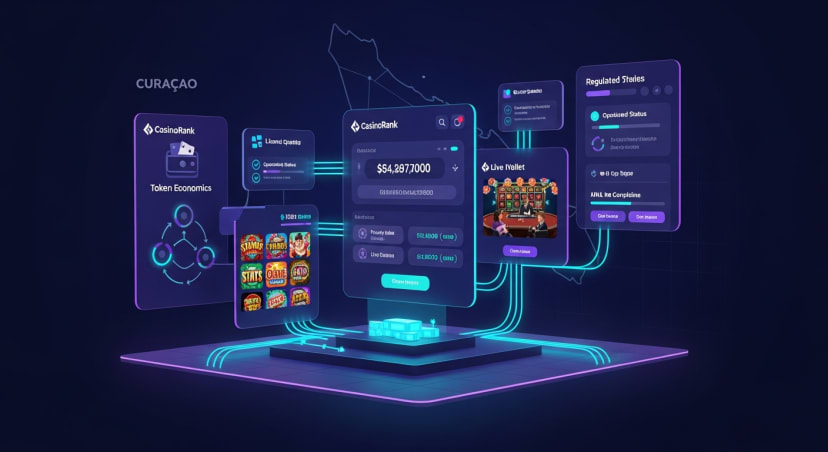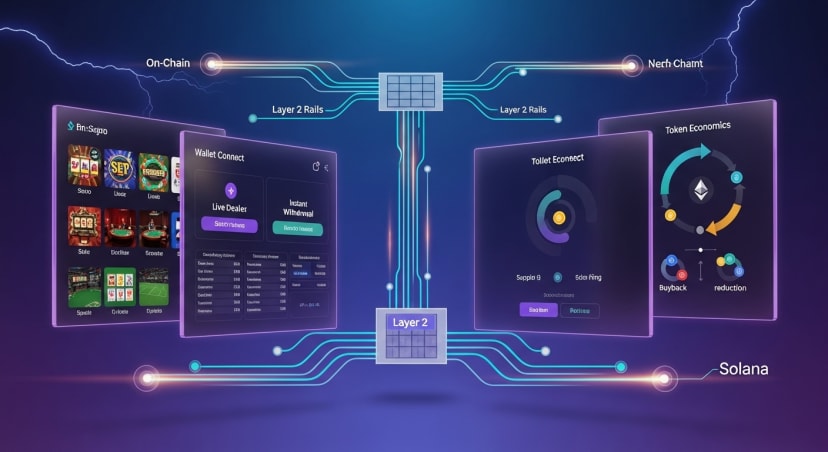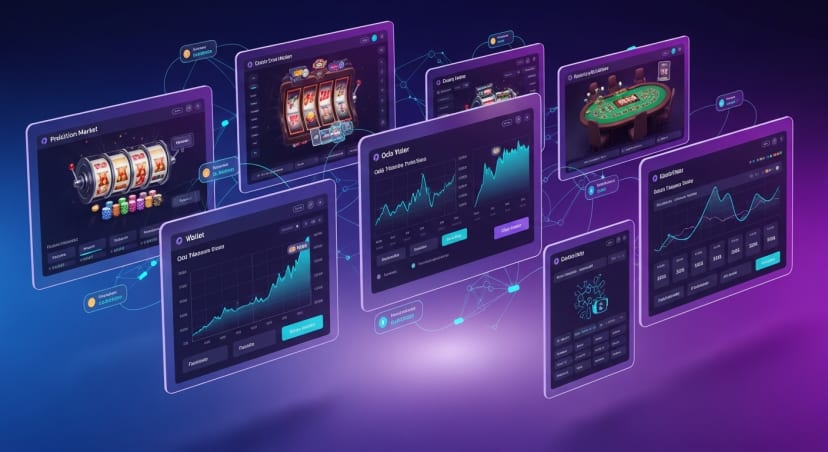We Call the Shots: Navigating Non-Custodial Crypto Casinos
We’ve come a long way from traditional online casinos that hold our funds in centralized accounts. In the world of blockchain gaming, non-custodial crypto casinos put us firmly in control of our own wallets. This shift gives us autonomy over deposits, withdrawals, and transaction privacy. In this article, we’ll explain what non-custodial casinos are, explore their key benefits, compare them to custodial alternatives, walk through how we can get started, and share best practices for wallet security and provably fair gaming for Singaporean players.
What Is a Non-Custodial Crypto Casino?
A non-custodial crypto casino is a platform where we keep full custody of our private keys and funds. Instead of transferring assets to a casino’s account, we connect our personal wallet—such as MetaMask or Trust Wallet—directly to the game interface. When we place a bet, a smart contract handles the transaction. Winnings go back to our wallet without passing through a third party. This model stands in contrast with custodial casinos, where the operator holds our deposits and controls withdrawals.
Key Benefits of Keeping Control for Singapore Players
Choosing a non-custodial casino brings several advantages that matter to us:
- Greater privacy and fewer KYC hurdles: We retain anonymity and avoid lengthy verification processes.
- Instant withdrawals: Funds move from smart contracts directly back to our wallets.
- Reduced counterparty risk: We trust the code instead of a centralized operator.
- Transparency via blockchain: We can verify transactions and contract logic on-chain.
These benefits let us focus on the gameplay rather than worrying about fund safety or processing delays.
Custodial vs Non-Custodial: A Quick Comparison
| Feature | Custodial Casino | Non-Custodial Casino |
|---|---|---|
| Fund Control | Held by operator | Held by user |
| Withdrawal Speed | Minutes to days | Seconds to minutes |
| Privacy and KYC | Extensive verification | Minimal or no KYC |
| Trust Model | Operator solvency risk | Code and smart contracts |
| Transaction Transparency | Internal ledger | Public blockchain records |
This table highlights how non-custodial platforms empower us to take charge of our funds, offering a superior experience for players in Singapore.
How To Get Started With Non-Custodial Casinos
Getting involved with a non-custodial casino is straightforward:
- Choose a Compatible Wallet
We pick a wallet that supports browser or mobile integration, like MetaMask or Trust Wallet, commonly used by players in Singapore. - Fund Our Wallet
We transfer our preferred cryptocurrency—such as ETH, BTC (via wrapped tokens), or USDT—to the wallet address. - Connect to the Casino Site
On the casino’s homepage, we click “Connect Wallet.” A pop-up asks for permission to link our wallet. We review permissions and approve. - Place Bets via Smart Contracts
We select a game, specify our bet amount, and confirm the transaction. The smart contract locks our stake and resolves the outcome. - Withdraw Winnings
When we win, we trigger a withdrawal transaction. The smart contract releases funds directly to our wallet.
Following these steps, we maintain direct ownership of private keys and funds throughout.
Best Practices for Wallet Security
To enjoy a safe gaming experience, we apply strict security measures:
- Secure our seed phrase: We write it down offline and store it in a safe place.
- Use hardware wallets: For large balances, hardware wallets add an extra layer of protection.
- Enable two-factor authentication: When possible, we secure both our wallet and exchange accounts.
- Keep software updated: We regularly update wallet apps and browser extensions.
- Test with small amounts: Before large bets, we place a few test transactions to confirm connectivity and contract behavior.
By following these practices, we reduce the chance of losing funds due to hacking or user error.
Understanding Provably Fair Gameplay
Provably fair gaming lies at the heart of blockchain casinos, giving us the confidence that each outcome is genuinely random and unaltered. At the foundation of this system is the smart contract code, which is either open-source or permanently recorded on the blockchain for anyone to review. To generate randomness, both the developers and our own wallets provide seeds, combining their inputs so that no single party can predict or control the result. Once a spin or hand concludes, we can examine the on-chain transaction details to confirm that the play followed the agreed logic and that neither side interfered with the outcome. This complete transparency builds trust and guarantees a fair gaming experience without the need to rely on hidden processes.
Regulatory Considerations
Legal Gambling Age
We always need to confirm that we meet the minimum gambling age in our jurisdiction before playing. This requirement protects both players and operators by ensuring compliance with local laws. Verifying our age upfront keeps the gaming environment safe and legitimate for everyone.
Jurisdictional Access Restrictions
Even in a decentralized setting, some platforms block users from specific countries or regions. These restrictions often stem from local gambling regulations or licensing agreements. By checking the casino’s list of approved countries, we avoid attempting access that could be legally prohibited.
Licensed Smart Contracts Only
Although non-custodial casinos typically skip extensive KYC, we should still ensure the underlying smart contracts are properly licensed. Licensed contracts undergo audits and meet regulatory standards, reducing the risk of bugs or malicious code. Sticking to vetted contracts helps us enjoy a secure and compliant gaming experience.
Decentralized Gaming Platforms: A New Era of Trust and Choice
Non-custodial gaming platforms are rapidly gaining traction, presenting a compelling alternative to traditional online casinos. These innovative platforms empower players with greater control and transparency by leveraging blockchain technology. A diverse selection of popular casino games are readily available, catering to a wide range of preferences:
Familiar Favorites Reimagined:
- Slots and Video Slots: Players can enjoy a vast array of themed slot games, from classic fruit machines to immersive video slots with intricate storylines and bonus features. The decentralized nature ensures that the random number generators (RNGs) are provably fair, eliminating concerns about manipulation.
- Roulette and Blackjack: Timeless table games like roulette and blackjack are offered in various formats, providing classic casino experiences within a transparent and auditable environment. Smart contracts govern the rules and payouts, guaranteeing fair gameplay.
- Poker and Dice Games: Players can participate in different poker variations and dice games, knowing that the outcomes are determined by verifiable cryptographic methods.
The Excitement of Live Dealer Interactions:
- Live Dealer Tables via Decentralized Streaming: One of the most exciting developments is the integration of live dealer tables. Utilizing decentralized streaming technologies, players can interact with real human dealers in real-time. This provides an immersive and engaging experience that closely mirrors playing in a physical casino, all while benefiting from the transparency and security of the blockchain.
Empowering Players Through Transparency:
The fundamental appeal of non-custodial platforms lies in their commitment to transparency and fairness. Players make informed decisions about the games they engage with, secure in the knowledge that the underlying smart contracts meticulously enforce the rules and guarantee timely payouts. This eliminates the need to trust a centralized authority, fostering a more direct and equitable gaming experience. The code governing the games and the payout mechanisms is often publicly auditable, providing an unprecedented level of trust and accountability within the online gaming industry. This paradigm shift empowers players, offering both entertainment and the assurance of a fair and secure gaming environment.
Future Innovations in Non-Custodial Gaming
As decentralized platforms mature, we’re seeing new innovations reshape our casino experience. One major trend is the integration of cross-chain compatibility, which allows us to use a wider variety of cryptocurrencies without bridging hassles. Instead of sticking to a single network, we’ll be able to move seamlessly between Ethereum, Binance Smart Chain, Solana, and others. This interoperability not only broadens our deposit options but also encourages competition among blockchains, driving down transaction fees and confirmation times for our bets and withdrawals.
Another exciting development is the emergence of decentralized autonomous organizations (DAOs) governing game development and community rewards. By participating in a casino DAO, we can vote on new features, bonus structures, and even theme designs. Our collective decision-making power transforms us from passive players into active stakeholders. In addition, DAO-driven reward pools can distribute earnings or launch special tournaments funded by community contributions, creating a more transparent and collaborative ecosystem.
We’re also witnessing advances in user-friendly interfaces that hide much of the blockchain complexity while retaining the benefits of non-custodial models. Gas-fee abstraction services let us play without manual fee estimation, and one-click wallet setups streamline onboarding for newcomers. As wallets and smart contracts evolve, we can expect richer game libraries—complete with live dealer integrations, multi-player tournaments, and NFT-based collectibles that offer ownership of rare in-game items. These virtual assets can sometimes be traded or staked, adding a new layer of strategy to our gameplay.
Looking ahead, regulatory clarity will play a pivotal role in mainstream adoption. As governments establish frameworks for decentralized gaming, we anticipate better safeguards for responsible play and clearer tax guidelines for winnings. By staying engaged with both developers and regulators, we can help shape policies that protect our interests without stifling innovation. Ultimately, non-custodial crypto casinos stand poised to deliver a gaming experience defined by fairness, control, and cutting-edge technology—letting us enjoy every spin with confidence and community backing.
Conclusion
Non-custodial crypto casinos put us back in the driver’s seat, offering privacy, transparency, and direct control over our funds. By connecting our personal wallets to smart contracts, we can enjoy instant withdrawals, provably fair gameplay, and minimal counterparty risk. With clear setup steps and security best practices, we can confidently explore decentralized gaming. As blockchain technology evolves, non-custodial platforms are poised to redefine our online casino experience—letting us play on our own terms.
FAQ
How does using a non-custodial casino enhance my privacy?
Non-custodial casinos in Singapore let you connect your crypto wallet directly, so you don’t need to deposit funds into the casino's account or share a lot of personal details. This keeps your identity more private.
Are crypto withdrawals really as fast as they say?
Withdrawal speeds depend on how fast the blockchain is. If the casino uses a quick network like Ethereum Layer 2 or Solana, your transaction can be confirmed in just seconds or minutes. This is much faster than traditional online casinos.
What happens if I lose my crypto wallet's private key?
If you lose your private key, you will lose access to your crypto funds. It’s very important to keep your seed phrase safe and consider using a hardware wallet for extra security.
Are there extra fees when using non-custodial casinos?
You’ll need to pay standard "gas" fees for blockchain transactions. Some casinos might also include a small service fee in their smart contract, but you shouldn’t see any surprise withdrawal fees.
How can I be sure the games are fair?
You can check the smart contract address on a blockchain explorer to see the code. Make sure the way the game generates random numbers follows provably fair standards. This ensures transparency and fairness.








